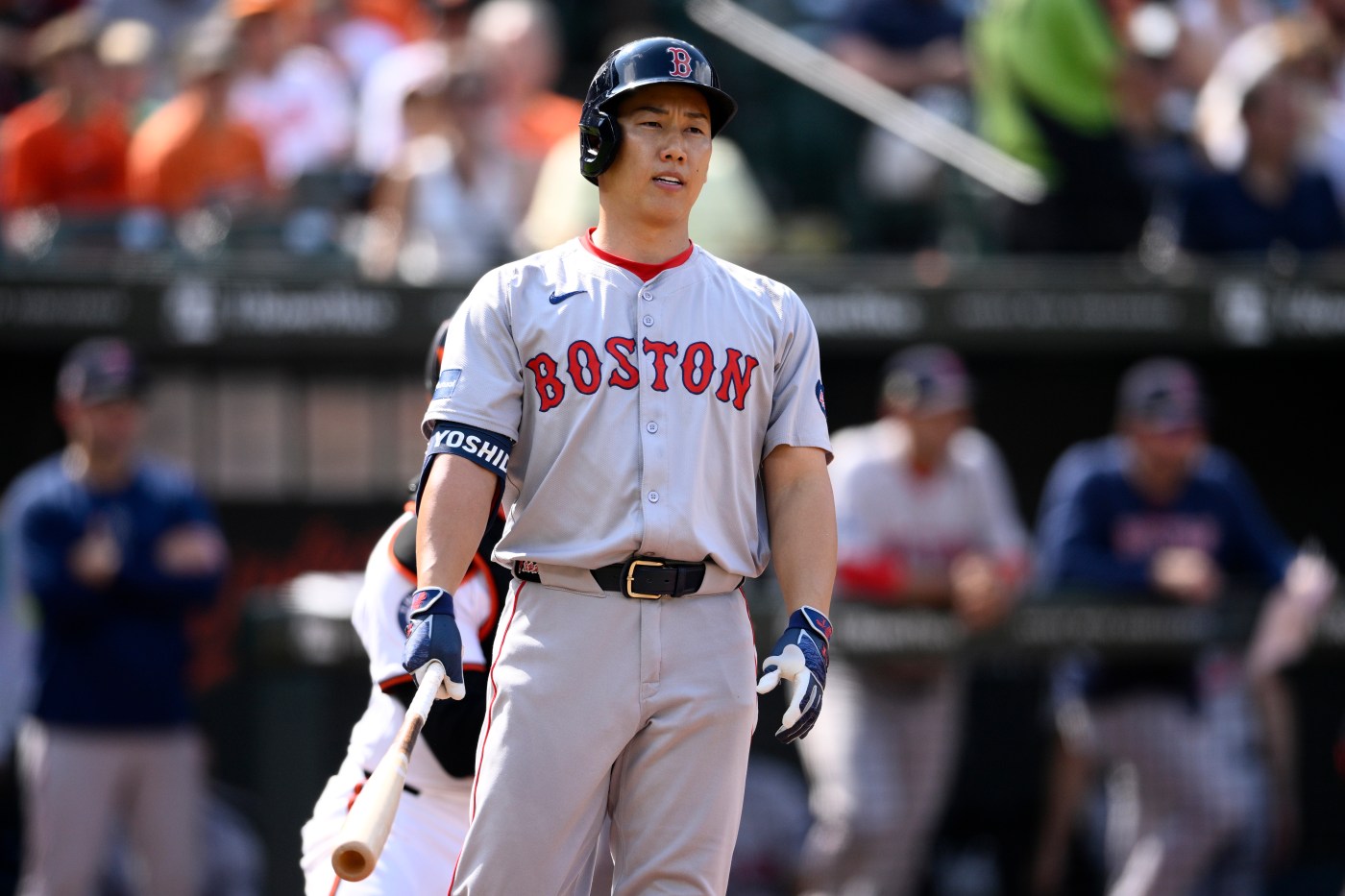
Red Sox club 11 hits but leave 11 on base in frustrating loss to Orioles
After using relievers Lucas Sims, Chris Martin, and closer Kenley Jansen on back-to-back nights, the Red Sox had backed themselves into something of a corner by the time Sunday’s finale with the Orioles rolled around: in order to win the series, they would either need to outscore Baltimore by a wide margin, or risk putting a close game in the hands of a shaky bullpen, the cause of too many losses since the All-Star break.
Instead, the Red Sox opted for what was behind Door No. 3: they out-hit the Orioles 11-3, but were 1-for-14 with runners in scoring position and left 11 men on base. That, more than anything, told the story of the 4-2 loss to the Orioles, which split the series.
“We put pressure on them the whole weekend,” Alex Cora told reporters. “I think offensively we are one of the best teams in the big leagues.”
It’s true, the Red Sox entered the day leading the Majors in doubles and the American League in hits, and top-five in the Majors in batting average, both on-base and slugging percentages, OPS, triples, and with the fourth-most runs scored of any club.
But on Sunday, the follow-through simply wasn’t there. Albert Suárez battled through his start, but the veteran right-hander ended up shutting out the Red Sox for six innings. He gave up seven hits – including two apiece to Yoshida, Triston Casas, and David Hamilton – and was charged with one pitch-timer violation, but issued zero walks and struck out six. When he had to make a big pitch, he made it. Or rather, when the Red Sox needed to capitalize, they didn’t. Beginning with Masataka Yoshida’s two-out single in the second, the first hit of the game, Boston left at least one man on base in six consecutive innings.
Kutter Crawford’s final line belies how dominant he was for the majority of his outing; over 5 ⅓ innings, he held the Orioles to three earned runs on two hits, walked one, hit a batter, and struck out four.
It was not unlike the right-hander’s previous start, in which he’d taken a perfect game into the sixth against the Texas Rangers, then found himself in big trouble, charged with four earned runs. With the exception of Adley Rutschman’s solo homer in the fifth – which gave Baltimore a 1-0 lead – Crawford cruised through five again on Sunday. Coming out of the All-Star break, he’d set an unfortunate MLB record by giving up 12 home runs over a three-start span, the first time any pitcher had allowed as many as 11 over three games in 20 years (Aaron Harang, 2004 Reds). But the righty had fared better keeping the ball in the yard over his recent outings; Rutschman’s blast snapped a streak of 12 ⅔ homer-less innings.
Once again, however, the sixth inning was Crawford’s cutoff point. Suddenly unable to find the zone, he issued a leadoff walk to Ramón Urías, then hit Colton Cowser to put two on. It didn’t help that when Triston Casas gunned to Ceddanne Rafaela, the shortstop was unable to complete the crucial double play, and airmailed the ball past the waiting Casas, allowing Urías to score.
“The red flag was the walk,” Cora told reporters. “The command was off, I felt.”
The defensive miscue proved costly immediately. Bailey Horn took over for Crawford and immediately served up a breaking ball to breaking-ball killer Gunnar Henderson. Because of Rafaela’s error, it was a two-run homer instead of a solo shot.
“He did what he usually does,” Cora said of Henderson, who homered in three of the four games.
“Yeah, it’s most definitely frustrating not being able to get through the sixth,” Crawford told reporters.
Usage is becoming a question mark at this point in the season. Crawford and Tanner Houck, who will start Monday in Houston, have already blown past their previous career-high innings pitched, and are now navigating uncharted territory. The Red Sox are trying to maintain a delicate balancing act, hoping for deep outings from a thin rotation, while striving to keep their remaining starters healthy and effective.
Crawford said he’s in a better place “mechanically” and “physically” now than right after the All-Star break. “I felt like command for the first five was great today, moving the ball inside, outside, but yeah, stuff-wise I feel like it’s starting to come back,” he said.
Only three of the four runs were charged to Crawford, but the landscape of this game was vastly different. Whereas the Red Sox already had a 6-0 lead when he’d faltered in his previous start – and would stay on top until game’s end – on Sunday, they were all hits and no runs.
In the eighth, the Red Sox finally seized part of an opportunity. Casas led off with a walk, and Rafael Devers put them both in scoring position with his 33rd double. The Orioles replaced Cionel Pérez with Yennier Cano, who managed to strike out Tyler O’Neill (0-for-4, 4 Ks), then walked Yoshida to load the bases.
In Boston’s best chance to make something happen, Alex Cora made a surprising move, sending rookie Mickey Gasper to pinch-hit for Connor Wong, and Gasper struck out swinging. Asked why he didn’t stick with Wong, who’s hit .318 with a .398 on-base percentage in 103 plate appearances with runners in scoring position, Cora said, “The kid is on the roster and he can hit. We felt that that was a good matchup for us, and it just didn’t work out.”
With two outs, Rafaela jumped on the first pitch and lined a sharp single to left, bringing Casas home and reloading the bases. The Orioles made their second pitching change of the inning, and closer Seranthony Domínguez, acquired from the Phillies at the deadline, got Romy Gonzalez to pop out to third on the second pitch to add three more to Boston’s already sizable left-on-base total.
The Red Sox were already one of six MLB teams to collect at least ten hits and score no more than one run in a game this season. Rob Refsnyder’s ninth-inning solo homer off the left-field foul pole saved his team from being the first to complete two such unbalanced games this season, but the rally bid ended there. Jarren Duran, Casas, and Devers struck out around him to end the peculiar afternoon.
“Tough one, but I think we played well during the series,” Cora said. “Move on and be ready for tomorrow.”
Splitting the series is a satisfactory outcome, especially after the Red Sox went 1-6 against the Orioles in their first two series of the season. But if the Red Sox want to take one of the three AL Wild Cards, they’ll need to be more than satisfactory.
“Every game is a big one for us. I’ve been saying that since (Opening Day in) Seattle,” Cora said. “Every pitch matters. Every pitch counts.”
Good news for the Red Sox pitching staff, at least: they only have to face Henderson three more times this season.


